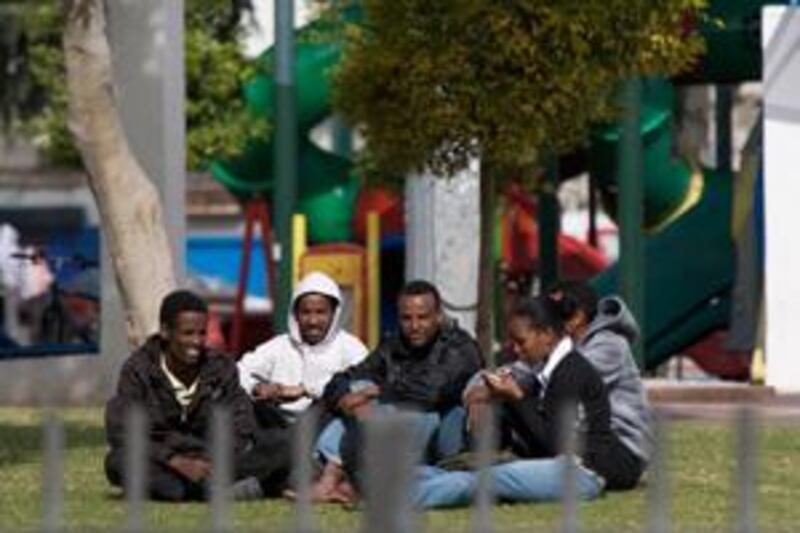TEL AVIV // Israel's practice of turning away African asylum-seekers who slip across the border from Egypt has prompted condemnation that it may be violating international law and spurred fears that the act endangers the migrants' lives.
The United Nations High Commissioner for Refugees (UNHCR) last week claimed that Israel's forcible return of the asylum-seekers to Egypt immediately after they make the perilous trek across the porous desert border was possibly illegal, in a statement described by rights activists as the body's sharpest criticism yet of the procedure. Such censure is viewed by the activists as a significant development that could advance a two-year-old petition to the Israeli Supreme Court demanding that Israel stop turning back migrants just hours after their infiltration from its 250-km frontier with Egypt - the controversial, so-called "hot return" policy that has been implemented since August 2007.
Activists have also lambasted Israel for carrying out that policy through soldiers posted at the border who, with little or no training, are ordered to conduct brief interviews with the infiltrators to determine whether they qualify for asylum. Anat Ben-Dor, head of a legal aid clinic at Tel Aviv University, which represents the migrants, said: "This practice is a disgrace for the state of Israel and a stain on its asylum procedures. It cannot be that human beings are expelled at the border after a soldier who has not been trained for this task interviews them for 10 minutes to decide whether they are refugees."
There are about 20,000 Muslim and Christian asylum-seekers in Israel, with three quarters of them from Eritrea and Sudan and most of the rest from the Ivory Coast, according to Israeli rights groups. Until today, Israel has granted refugee status to only about 170 of them, according to official figures, many of whom have immigrated to Canada. In the first nine months of this year, Israel said it has returned to Egypt 217 asylum seekers who were caught within a day of their arrival, although activists claim the actual numbers are higher.
The Israeli government considers most of the newcomers as economic migrants and fears that if it embraces them, thousands would follow. The government is also worried about further reducing the country's Jewish majority, especially in the face of a growing Palestinian population both within its borders and in the Israeli-occupied West Bank. But critics of its policy say more sympathy should be expected from a country established six decades ago by refugees who had escaped the historic persecution of Jews that culminated in the Holocaust. After all, Israel was also one of the first signatories to the 1951 Convention Relating to the Status of Refugees, which forbids expelling or returning a refugee or asylum-seeker to a country where his or her life or freedom could be threatened.
Israel began cracking down on the infiltrators in 2007, turning many of them back to Egypt, where they often face imprisonment and torture and are frequently deported to their countries of origin, where activists claim their lives are at risk. Ms Ben-Dor said she had been contacted by Israeli soldiers concerned about the clampdown and Israel's violations of even its own return policies. One reservist claimed that his battalion was ordered one night last June to force some 26 newcomers who had crossed the border a few days earlier back to the Egyptian side and fire light flares, shoot in the air to yell in a bid to stage an infiltration that had just been discovered. The reservist said his commander had told him that Egyptian border guards were more likely to take back the migrants if it appeared they had just crossed.
While Egypt for years has tolerated tens of thousands of Africans on its territory, its treatment of them has soured amid pressure from Israel to halt their rising influx into its territory. Since then, Egypt's deportations of asylum-seekers were its largest in decades and its police have also shot dead dozens of them at the Israeli border. At least 17 migrants have been killed since May, most recently on Tuesday, when an infiltrator was shot after he ignored orders to stop.
According to the statement by the UNHCR, asylum-seekers returned to Egypt are often imprisoned for as long as one year, have to pay fines and face a "strong likelihood" of being deported to a country where they may be persecuted. Furthermore, since early 2008, they have increasingly been blocked from access to the UN body's procedures for determining refugee status. It said in the statement: "In light of the present conditions in Egypt, and in the absence of any formal agreement between Egypt and Israel presenting sufficient guarantees for the safety and protection of returned asylum seekers - UNHCR considers that so-called 'hot returns' may be inconsistent with Israel's commitments under international refugee and human rights law."
Foreign.desk@thenational.ae





